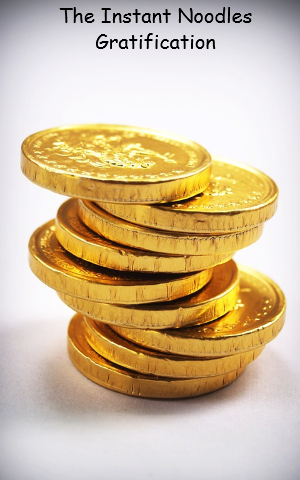The Instant Noodles Gratification
The Instant Noodles Gratification


I am hoping that the readers are familiar that we are in the centennial age where instant foods are used more rapidly than ever. The noodles war that started in the last decade is yet to be over and the ever-growing demand to have ready to eat items are only an indication of structural changes in eating habits.
Our Indian economy was also waiting, (has been waiting, will be waiting) for some booster dose of ready to consume reform decades back when the economy was in doldrums and survival through the fortnight was seeming to be impossible. The policymakers attitude to wait for a crisis to bring reforms for the economy has been out of an understanding of many. The old-age saying that precaution is better than cure is nowhere to be seen in the intentions of the REFORM MAKERS. ALWAYS REFORM MAKERS NEVER POLICYMAKERS !!
Starting from the very first packet of ready to eat reform that the economy received - 1991
When then Finance Minister Mr Manmohan Singh introduced the Union Budget, it was with an expectation that the balance of payment situation will be improved, fiscal and revenue deficit be brought down, and thereby bring stabilisation in the economy.
“.......our objective to progressively reduce the fiscal deficit of the Central Government, to move towards a significant reduction of the revenue deficit, and to reduce the current account deficit in the balance of payments.”
“There is no time to lose,” he said.
With the firm objective and long born vision in mind, he introduced the reforms of LPG.
“ .......time has come to expose Indian industry to competition from abroad in a phased manner. As the first step in this direction, the Government has introduced changes in import-export policy, aimed at a reduction of import licensing, vigorous export promotion and optimal import compression. The exchange rate adjustments on 1st and 3rd July 1991 and the enlargement and liberalisation of the replenishment licence system constitute the two major initial steps in the direction of trade policy reform. They represent the beginning of a transition from a regime of quantitative restrictions to a price based mechanism.”
This ushered the era of FDI FPI FII and whatnot, leading to an unstable environment for businesses, stock markets, financial markets, etc. Competitiveness increased for sure which has its own benefits like choices to consumers and a zeal to produce a better quality product due to availability of higher quality imported products at every nook and corner.
This run for money and wealth and the fast-paced acceleration of globalisation, privatisation, liberalisation, industrialisation, "technologization" of the new age human being as a whole had come in this country called Bharat, ( the sone ki chidiya ) at some cost but had had it's own benefits too. Now one and self is more connected to the world and a decision of a committee seven seas away affects this upcoming and upgrading at a very large scale now. The world can not ignore what this new age "India" is and what it is to become in the near future.
Now the times have changed and a little pro-activeness rather than re-activeness is the need of the hour nowadays if this country wants to succeed in this moving fast-paced life.























